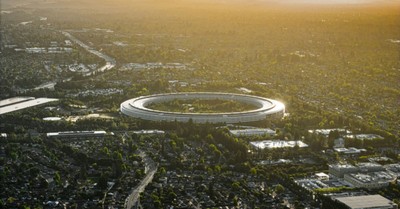Has Silicon Valley Finally Found its God?
Dr. James Emery White


Audio By Carbonatix
By Dr. James Emery White, Crosswalk.com
Is Google God?
Columnist Thomas Friedman posed this question in the New York Times in June of 2003. Quoting the vice president of a Wi-Fi provider, Friedman writes that: “Google, combined with Wi-Fi, is a little bit like God. God is wireless, God is everywhere and God sees and knows everything. Throughout history, people connected to God without wires. Now, for many questions in the world, you ask Google, and increasingly, you can do it without wires, too.”
More than two decades later, not many would ask if Google is God. However, they might wonder if AI is.
Nobel Prize winner Geoffrey Hinton, sometimes referred to as the “Godfather of AI,” helped lay the foundation for the AI technology often used today. Concerned about what he had helped birth, in 2023 he left his job at Google where he had worked for more than a decade to sound a warning: “It really is godlike.”
He’s not alone. Open AI CEO Sam Altman has referred to his company’s technology as a “magic intelligence in the sky.” Peter Thiel, co-founder of PayPal and Palantir, has even argued that AI could help bring about the antichrist.
Whether warning about the existential threat the power of AI poses to humanity or arguing for a technological revelation that will usher in a new age of human evolution, it seems everyone is approaching it with a religious set of glasses.
Or even as a religion itself.
“Computer scientist and author Ray Kurzweil has been predicting since the 1990s that humans will one day merge with technology,” reports the Associated Press, “a concept often referred to as transhumanism.” When asked if he considers AI to be his religion, he eventually conceded, “Yes.”
The god of technology promises a new world. Professor Robert Geraci, who studies religion and technology at Knox College, first noticed religious language being used to describe AI’s potential in the early 2000s. He said that the language reminded him of early Christianity: “Only we’re gonna slide out God and slide in... your pick of cosmic science laws that supposedly do this, and then we were going to have the same kind of glorious future to come.” Reflecting on how pervasive this kind of language and these kinds of ideas have become, Geraci adds, “What was once very weird is kind of everywhere.”
This is new to the tech world. As noted by the Associated Press, “Its secular reputation has so preceded it that one episode of the satirical HBO comedy series, ‘Silicon Valley,’ revolves around ‘outing’ a coworker as Christian.”
But this is not the embrace of the Christian faith—it’s anything but. Rather, it’s the embrace of technological faith. Of AI becoming our “higher power.” Or as Mark Zuckerberg was quoted when promoting his own company’s efforts in AI, “When people in the tech industry talk about building this one true AI, it’s almost as if they think they’re creating God.”
We live in a technological age, and have embraced technological advances with abandon, creating what Neil Postman termed a “technopoly,” where technology of every kind is cheerfully granted sovereignty. Or, as Jacques Ellul has written, at least the process of technique is designed to serve our ends.
Ironically, within the word “technology” itself lies the new philosophical mooring that marks our intent.
The word is built from such Greek words as technites (craftsman) and techne (art, skill, trade), which speak to the idea of either the person who shapes or molds something, or to the task of shaping and molding itself.
But it is the Greek word logos, to which technites is joined, that makes our term “technology” so provocative.
Logos is a reference within Greek thought to divine reason, or the organizing principle of the world. In John’s gospel, logos was used to communicate to those familiar with the Greek worldview the idea of the divinity of Jesus.
Moderns have put together two words that the ancients would not have dared to combine, for the joining of the words intimates that mere humans can shape the very order of the world.
So while technology itself may be neutral in its enterprise, there can be no doubt that within the word itself are the seeds for the presumption that would seek to cast God from His throne and assert humanity in His place as the conduit of divine power.
Or at least something that humanity itself has created.
James Emery White
Sources
Thomas L. Friedman, “Is Google God?” The New York Times, June 20, 2003, read online.
Krysta Fauria, “AI Apocalypse? Why Language Surrounding Tech Is Sounding Increasingly Religious,” AP News, August 29, 2025, read online.
Krysta Fauria, “How Silicon Valley Is Using Religious Language to Talk About AI,” AP News, August 29, 2025, read online.
Neil Postman, Technopoly: The Surrender of Culture to Technology.
Jacques Ellul, The Technological Society, translated from the French by John Wilkinson.
On the meaning of the words techne and technites see the article on “Carpenter, Builder, Workman, Craftsman, Trade” by J.I. Packer in The New International Dictionary of New Testament Theology, Vol. 1, Colin Brown, editor.
Photo Courtesy: ©Unsplash/Huenerfuerst
Published Date: September 15, 2025
James Emery White is the founding and senior pastor of Mecklenburg Community Church in Charlotte, NC, and a former professor of theology and culture at Gordon-Conwell Theological Seminary, where he also served as their fourth president. His latest book, Hybrid Church: Rethinking the Church for a Post-Christian Digital Age, is now available on Amazon or from your favorite bookseller. To enjoy a free subscription to the Church & Culture blog, visit churchandculture.org where you can view past blogs in our archive, read the latest church and culture news from around the world, and listen to the Church & Culture Podcast. Follow Dr. White on X, Facebook, and Instagram at @JamesEmeryWhite.


